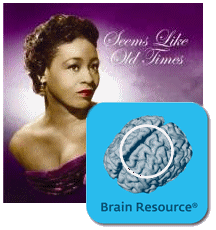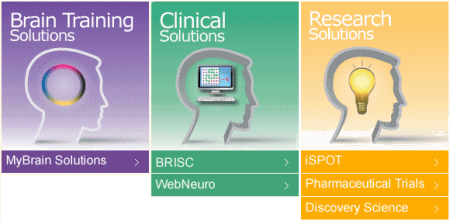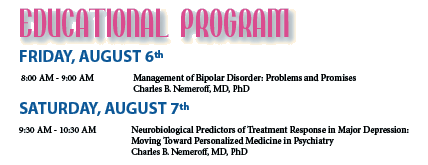 Think I’d ever get off of STAR*D? I’m trying, but the next one I thought I’d take a look at, iSPOT, just "seems like old times." The whole gang is back. A. John Rush and Stephen R Wisniewski are there from STAR*D – with sidekick medical writer Jon Kilner in the acknowledgments for his editorial support. Fresh off of their stint on POGO’s front page, Charles Nemeroff and Alan Schatzberg are in the house as well. And they’re using our old friend the QIDS-SR as one of their psychometrics to follow the subjects in their study. How did this particular group of scandal-haunted luminaries end up together? They’ve all been assembled there by a commercial enterprise called The Brain Resource Company.
Think I’d ever get off of STAR*D? I’m trying, but the next one I thought I’d take a look at, iSPOT, just "seems like old times." The whole gang is back. A. John Rush and Stephen R Wisniewski are there from STAR*D – with sidekick medical writer Jon Kilner in the acknowledgments for his editorial support. Fresh off of their stint on POGO’s front page, Charles Nemeroff and Alan Schatzberg are in the house as well. And they’re using our old friend the QIDS-SR as one of their psychometrics to follow the subjects in their study. How did this particular group of scandal-haunted luminaries end up together? They’ve all been assembled there by a commercial enterprise called The Brain Resource Company.
What is The Brain Resource Company? I’ll be honest, it’s not exactly clear to me. Their list of products looks like the icons on an over-loaded iPhone:

And iSPOT is just one of those products. They do brain training, and psychometrics of an almost infinite variety, Clinical Trials, drug studies, the list goes on. I’ll stick with their iSPOT product.
|
International Study to Predict Optimized Treatment Response (iSPOT) – in depression and ADHD
iSPOT is the largest current Personalized Medicine research study in mental health with the potential to change the way we treat depression and ADHD. At present there is no way to objectively select the correct antidepressant medication to be prescribed in the first instance. Using all the methodology in the picture below, in a standardized manner, iSPOT is assessing which brain and body markers can predict the right medication for the right person at the right time. This will help to personalize treatment in depression and ADHD. Translational – clinicians will have less trial and error and more objectivity in selecting the right treatment.
|
In the PubMed abstract and clinicaltrials.gov, things are toned down a bit:
International Study to Predict Optimized Treatment for Depression (iSPOT-D), a randomized clinical trial: rationale and protocol.
by Williams LM, Rush AJ, Koslow SH, Wisniewski SR, Cooper NJ, Nemeroff CB, Schatzberg AF, Gordon E.
Trials. 2011 Jan 5;12:4.
AbstractBACKGROUND: Clinically useful treatment moderators of Major Depressive Disorder (MDD) have not yet been identified, though some baseline predictors of treatment outcome have been proposed. The aim of iSPOT-D is to identify pretreatment measures that predict or moderate MDD treatment response or remission to escitalopram, sertraline or venlafaxine; and develop a model that incorporates multiple predictors and moderators.METHODS/DESIGN: The International Study to Predict Optimized Treatment – in Depression (iSPOT-D) is a multi-centre, international, randomized, prospective, open-label trial. It is enrolling 2016 MDD outpatients (ages 18-65) from primary or specialty care practices (672 per treatment arm; 672 age-, sex- and education-matched healthy controls). Study-eligible patients are antidepressant medication (ADM) naïve or willing to undergo a one-week wash-out of any non-protocol ADM, and cannot have had an inadequate response to protocol ADM. Baseline assessments include symptoms; distress; daily function; cognitive performance; electroencephalogram and event-related potentials; heart rate and genetic measures. A subset of these baseline assessments are repeated after eight weeks of treatment. Outcomes include the 17-item Hamilton Rating Scale for Depression (primary) and self-reported depressive symptoms, social functioning, quality of life, emotional regulation, and side-effect burden (secondary). Participants may then enter a naturalistic telephone follow-up at weeks 12, 16, 24 and 52. The first half of the sample will be used to identify potential predictors and moderators, and the second half to replicate and confirm.DISCUSSION: First enrolment was in December 2008, and is ongoing. iSPOT-D evaluates clinical and biological predictors of treatment response in the largest known sample of MDD collected worldwide.
In case you wondered if the NIMH funded STAR*D study was aiming in a commercial direction, or if you thought that Nemeroff and Schatzberg were just dabbling in entrepreneurship with VNS stimulation, Lithium patches, or Corcept, the answer is in. Drs. Rush, Nemeroff, Schatzberg, Wisniewski, et al have thrown their lot in full bore with The Brain Resource Company. This time, the profit isn’t in the drugs, it seems to be in the instruments they’re testing to predict "Personalized Treatment" for Depression and ADHD. For several decades, these guys have denied that their first and foremost concern was getting a market share in the treatment of mental illness business. This little foray ought to lay those questions to rest. And if the real results of STAR*D are any indicator, they may well be barking up the wrong tree once again – like with the vagus nerve zapper or the abortion drug as an antidepressant. And I find myself recalling Dr. Nemeroff’s C.M.E. talk last summer at the Georgia Psychiatric Physicians Meeting. I wondered what he had up his sleeve with that personalized medicine topic. How is that C.M.E.?:

Incredible! can you hardly wait for Nemeroff to promote the “long term prevention of mental illness Li patch”? that’s what the angle will be, along w Fuller Torrey and his ‘preventative measures to prevent SZ’ w the under the skin Haldol disk! Those 2 have a self-appointed KOL profile that is based on the almighty dollar and want ppl to think they “care”. Sad thing is, average ppl will not know how these manipulators work, it’s not for the ‘good of society’ it’s for their pockets and fame and fortune…. the VNS thing always gets a lot of interest when you write abt that and Nemeroff together!
These guys would make great politicians, unfortunate they are “doctors”.
This is such nonsense! But with all of the measures and tests, I hope they solve the riddle of the placebo effect, which, after all, is the basis for about 90% of the effect of antidepressants medication for most people!